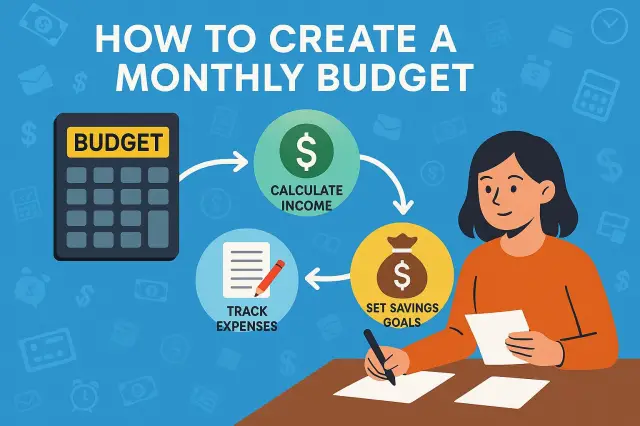Building a monthly budget is one of the most effective steps toward achieving financial stability and long-term wealth. Whether you're trying to stop living paycheck to paycheck, save for a big goal, or simply become more aware of your spending habits, a solid budget is the foundation of smart money management.
Thanks to modern tools, creating a budget doesn’t have to be intimidating. In fact, with a comprehensive financial calculator, you can build your custom plan in minutes—no spreadsheets or accounting degrees required.
Why Monthly Budgeting Is Essential
Budgeting gives you clarity. Instead of wondering where your money went, you’ll know exactly how every dollar is spent. This empowers you to:
- Prevent overspending and impulse purchases
- Save consistently toward both short-term and long-term goals
- Reduce or eliminate debt
- Plan for life changes like buying a home or having children
- Minimize financial stress by making informed decisions
One of the best ways to stay organized is by using a budget calculator, which helps you track income, expenses, savings, and debt in one place.
Start With Your Net Income
Before you can create a budget, you need to know exactly how much money you’re working with each month. That’s your net income—what you actually take home after taxes, benefits, and other deductions.
If you’re unsure of your post-tax income, use the Net Salary Calculator to quickly determine your true monthly income based on your country, salary structure, and tax rate.
Be sure to include all income sources:
- Primary job salary or wages
- Side hustles or freelance work
- Passive income (rent, dividends, royalties)
- Bonuses, commissions, or seasonal income
Identify and Categorize Your Expenses
Next, list every expense you have during the month. These fall into two categories:
- Fixed Expenses: Rent/mortgage, car payments, insurance, subscriptions
- Variable Expenses: Groceries, dining out, gas, shopping, entertainment
If you're not sure where to start, reviewing your last two or three bank statements will help you identify recurring charges and estimate spending averages.
Planning for Major Expenses
If you have a mortgage or plan to buy a home, the Mortgage Calculator helps you estimate monthly payments including principal, interest, taxes, and insurance—vital for forecasting your monthly housing costs accurately.
Likewise, if you’re repaying or considering taking a loan, the Loan Calculator allows you to model different interest rates, terms, and repayment strategies.
Incorporate Savings and Emergency Planning
Savings shouldn’t be an afterthought—it should be a fixed line in your budget, just like rent or utilities. Allocate at least 10–20% of your net income if possible to:
- Emergency fund
- Retirement or investment contributions
- Short-term goals (vacation, holidays, purchases)
- Long-term goals (home down payment, education fund)
If you're changing jobs or facing a layoff, planning is especially important. Use the Severance Calculator to understand your potential payout and how to stretch it across future months within your budget.
Use a Budget Calculator to Visualize Everything
Once you have your income and expenses laid out, plug them into a Budget Calculator. This will allow you to:
- Quickly see income vs. expenses
- Break down your costs by category
- Spot areas of overspending
- Plan adjustments for next month
Some calculators even allow you to compare actual vs. projected numbers so you can refine your estimates over time and hold yourself accountable.
Track Your Financial Growth with ROI Insights
If you're investing or using your money for growth opportunities, knowing your return is essential. A Return on Investment (ROI) Calculator helps you determine how much value your money is generating—whether it's a stock portfolio, business investment, or savings account.
For longer-term financial growth projections, the Investment Return Calculator allows you to simulate compound growth based on recurring contributions, time horizon, and expected rate of return. This is especially useful for budgeting future savings contributions.
Customize a Budgeting Method That Fits You
Not all budgeting strategies are created equal. Try one of the following to match your personality and goals:
1. 50/30/20 Budgeting
Popular and beginner-friendly:
- 50% on needs (housing, food, bills)
- 30% on wants (fun, shopping, non-essentials)
- 20% on savings and debt
2. Zero-Based Budgeting
Allocate every dollar a purpose—income minus expenses equals zero. This strategy forces discipline and accountability.
3. Pay Yourself First
Start your budget by allocating money to savings/investments, and then plan your expenses with what’s left. Ideal for building wealth consistently.
4. Envelope System (Digital Version)
Assign money to digital “envelopes” for each spending category. Spend only what’s in the envelope to control impulsive buying.
Tips to Maintain and Improve Your Budget Monthly
- Review your budget at the start and end of every month
- Adjust for seasonal or unexpected expenses (holidays, repairs)
- Set realistic goals and track your progress visually
- Celebrate small wins to stay motivated
How Financial Calculators Help You Stay in Control
Calculatorr’s full suite of financial calculators are free and easy to use. They take the guesswork out of your finances and give you the power to:
- Make confident, target="_blank" rel="noopener">budget calculator and a suite of reliable financial tools, you can take control of your money, reduce financial anxiety, and start building the life you truly want.
Start today. Your budget is your blueprint for freedom, stability, and growth—now it’s time to build it.




